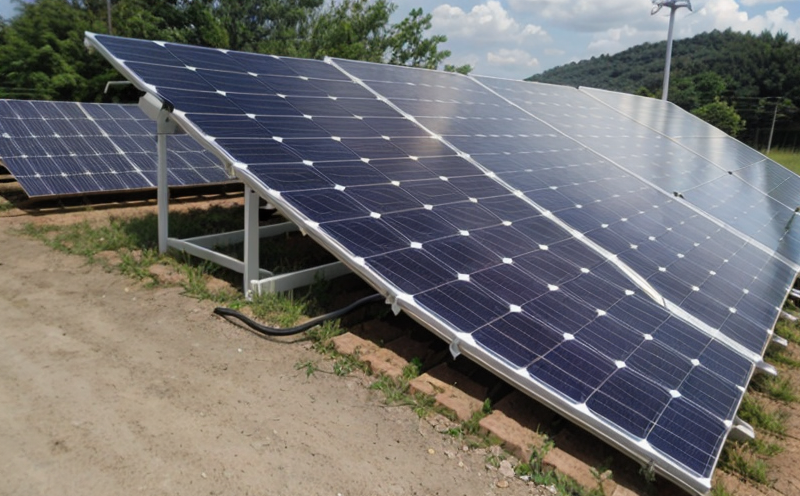IEC 61730-2 UV Radiation Resistance Testing
The International Electrotechnical Commission (IEC) standard IEC 61730-2 is a critical guideline for the testing of photovoltaic (PV) modules. This particular part focuses on evaluating the UV radiation resistance of solar panels, ensuring they can withstand prolonged exposure to harmful ultraviolet rays without degradation in performance and safety.
UV radiation can significantly impact the lifespan and efficiency of PV modules by causing materials like encapsulants and backsheet layers to age prematurely. By conducting IEC 61730-2 testing, manufacturers ensure that their solar panels meet the stringent requirements outlined in this standard. This not only enhances product reliability but also promotes trust among consumers and regulatory bodies.
The test involves exposing PV modules to controlled UV radiation over a specified duration. The exposure conditions are designed to simulate real-world environmental factors that could affect module performance, such as sunlight, temperature variations, and humidity levels. After the exposure period, various parameters are measured to determine if there has been any significant change in the electrical characteristics or mechanical integrity of the modules.
For quality managers and compliance officers responsible for ensuring product standards, this test is essential. It provides empirical evidence that your solar panels can maintain their performance under extreme conditions, thereby reducing warranty claims and enhancing brand reputation. Additionally, R&D engineers benefit from this testing as it helps identify potential weaknesses in design or manufacturing processes early on.
IEC 61730-2 is one of several tests mandated by international standards for PV module certification. It works hand-in-hand with other tests like IEC 61730-1, which covers mechanical and electrical performance aspects, to provide a comprehensive evaluation of solar panels.
In summary, undergoing IEC 61730-2 UV radiation resistance testing ensures that your photovoltaic modules meet the highest industry standards, providing assurance about their long-term durability and reliability. This is particularly important for companies looking to establish themselves as leaders in the renewable energy sector.
Applied Standards
The IEC 61730-2 standard primarily focuses on the UV radiation resistance of photovoltaic (PV) modules, ensuring they can withstand prolonged exposure without significant degradation. This standard is part of a series that collectively provides comprehensive guidelines for PV module testing and certification.
- IEC 61730-1: General requirements including electrical performance tests.
- IEC 61730-2: Environmental stress tests, specifically UV radiation resistance.
- IEC 61730-3: Fire safety test for PV modules.
- IEC 61730-4: Reverse current protection requirements.
These standards are crucial in the renewable energy sector as they help ensure that solar panels meet rigorous quality and safety criteria. By adhering to these guidelines, manufacturers can produce reliable products that contribute positively to sustainable development efforts worldwide.
Benefits
- Increased Product Reliability: Ensures that PV modules maintain their performance under harsh environmental conditions.
- Elevated Brand Reputation: Demonstrates commitment to quality and reliability, enhancing customer trust.
- Reduction in Warranty Claims: By ensuring durability through rigorous testing, companies can minimize service requests related to premature failure.
- Enhanced Regulatory Compliance: Meeting international standards helps businesses comply with local regulations more easily.
- Increased Market Competitiveness: Reliable products are better positioned in competitive markets, attracting more customers and investments.
- Promotion of Sustainable Development: Ensuring high-quality PV modules supports the broader goal of promoting renewable energy sources.
The benefits extend beyond just individual companies; they contribute to a more robust and sustainable solar industry overall. Compliance with these standards fosters innovation while maintaining safety standards, making them indispensable for any serious player in the photovoltaic market.
Why Choose This Test
Selecting IEC 61730-2 UV radiation resistance testing is a strategic decision that offers numerous advantages. First and foremost, it ensures compliance with international standards, which is crucial for both domestic and export markets. Meeting these requirements not only simplifies the certification process but also opens up new opportunities for market expansion.
From a technical standpoint, this test provides valuable insights into how your PV modules will perform under real-world conditions. By simulating exposure to UV radiation, you can identify potential weaknesses in design or manufacturing processes early on, allowing for necessary adjustments before mass production begins.
The test also helps build confidence among stakeholders, including investors and end-users. Demonstrating a commitment to quality through rigorous testing enhances your reputation as a reliable supplier of high-performance solar panels. This perception translates into increased market share and better relationships with customers who value sustainability and reliability.
Moreover, undergoing this type of testing can significantly reduce the risk of product recalls or returns due to premature failure caused by UV exposure. Such incidents are costly both in terms of financial losses and reputational damage. By investing in IEC 61730-2 testing early on, you protect yourself against these risks.
In conclusion, choosing IEC 61730-2 UV radiation resistance testing is a forward-thinking approach that supports your company's long-term goals in the renewable energy sector. It ensures compliance with industry standards, improves product reliability, and builds trust among key stakeholders—all essential elements for sustained success.





